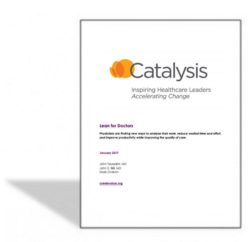Today, I'm happy to share a link to a white paper that I co-authored for Catalysis (formerly the ThedaCare Center for Healthcare Value).
The paper is titled: “Lean for Doctors.”
Appropriately, the co-authors are two physician leaders you might very well know: Dr. John Toussaint (founder of Catalysis) and Dr. Jack Billi (from the University of Michigan).
We wrote the article for a physician reader, to help them understand why Lean is appropriate and relevant for them, the role they can play in Lean improvement, and how Lean thinking is a parallel to medical thinking in many ways.
Click to read it (free and quick registration required). Please comment here if you have thoughts or reactions to the white paper.
How do you react to it as a physician?
As a non-physician? How do you think physicians you work with would react?
Should we also write “Lean for Nurses?” :-) Lean for Medical Technologists? Lean for Housekeeping Associates?
Hear Mark read this post (subscribe to the podcast):
What's in the Paper?
I agree with Catalysis, of course, when they say:
“We at Catalysis feel the science of healthcare management significantly lags behind progress in clinical medicine, yet the management of healthcare has serious consequences. This white paper outlines what can be done to provide structure to better manage healthcare and engage Physicians in the process.“
The paper includes these points:
- Best practices for getting physicians to accept standard work
- (I'd add this means engaging them in defining standardized work, not forcing them to follow something you came up with)
- Comparison of the “SOAP” model to the PDCA cycle
- Applying lean principles to problem solving
- How major university hospitals apply lean thinking every day
- Lean to align, enable, and improve
- From lean thinking practitioners to lean health systems
Excerpt
Here are some short excerpts from the paper:
“As healthcare organizations explore and embrace scientific problem solving by all clinicians and staff, it is critically important to engage physicians in this process. Lean offers physicians a means to remove non-value-added activities that unnecessarily exhaust their time and energy, and, thus, frees time for doctor-to-patient care. Unlike old management models that typically attempt to force change upon physicians and other healthcare professionals, Lean engages everybody in the practical science of improvement. As such, physicians and other clinicians should be familiar with Lean principles and they should be using them daily in the care of patients.
…
Great medical care and Lean thinking in healthcare have much in common, and the both drive toward common objectives (Figure 1). With Lean, clinicians can apply their aptitude and experience to solving system problems related to clinical quality and safety, while simultaneously improving the timeliness of care, cost, and throughput issues.
…
The science of healthcare management significantly lags progress in clinical medicine. There are no placebo-controlled, double-blind studies proving best management practices. Yet the management practices applied in healthcare have serious consequences to the staff, patients, and their families.”
Again, click here to access the paper.
I was happy to see this on Friday:
Past Articles and Podcasts
Here are some past articles and podcasts with John Toussaint and Jack Billi from my archives:
Have a great weekend!
Please scroll down (or click) to post a comment. Connect with me on LinkedIn.
Let’s work together to build a culture of continuous improvement and psychological safety. If you're a leader looking to create lasting change—not just projects—I help organizations:
- Engage people at all levels in sustainable improvement
- Shift from fear of mistakes to learning from them
- Apply Lean thinking in practical, people-centered ways
Interested in coaching or a keynote talk? Let’s start a conversation.









![When Was the Last Time a Leader Around You Admitted They Were Wrong? [Poll]](https://www.leanblog.org/wp-content/uploads/2025/07/Lean-Blog-Post-Cover-Image-2025-07-01T212509.843-100x75.jpg)
